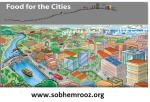کشاورزان ایران(نوین)]
جوانان ایتالیایی در برنامههای توسعه در خارج از کشور فعالیت میکنند
توافق همکاری شبکه سازمانهای غیردولتی ایتالیا و فائو برای ایجاد امنیت غذایی و توسعه روستایی
داوطلبان جوان و واجد شرایط از سراسر ایتالیا طی توافقنامهای، قادر خواهند بود تا در راستای همکاری در زمینه امنیت غذایی و توسعه روستایی به دفاتر فائو در سراسر جهان بپیوندند. این توافقنامه هشتم ژوئن ۲۰۱۷، بین سازمان فائو و نهاد FOCSIV که شامل شبکه ای از سازمانهای غیردولتی ایتالیا است، امضا شد.
داوطلبان جوان و واجد شرایط از سراسر ایتالیا طی توافقنامه ای ، قادر خواهند بود تا در راستای همکاری در زمینه امنیت غذایی و توسعه روستایی به دفاتر فائو در سراسر جهان بپیوندند. این توافقنامه هشتم ژوئن ۲۰۱۷، بین سازمان فائو و نهاد FOCSIV (۱) که شامل شبکه ای از سازمان های غیر دولتی ایتالیا است، امضا شد.
به گزارش ایانا از سایت فائو، FOCSIV با به کارگیری جوانان داوطلب به صورت بین المللی ، آن ها می توانند در برنامه های توسعه در خارج از کشور فعالیت کنند. از طریق توافق جدید، جوانان ایتالیایی به پروژه فائو به منظور مبارزه با گرسنگی و سوء تغذیه و ترویج امنیت غذایی و توسعه پایدار روستایی از طریق صندوق(بودجه) دولت ایتالیا ، می پیوندند.
این توافقنامه توسط دانیل گوستافسون ، معاون برنامه ریزی دبیر کل فائو و رئیس FOCSIV، Gianfranco Cattai، امضا شد.
گوستافسون گفت: "این همکاری با جوانان می تواند ایده ها و انرژی جدیدی را برای دفاتر فائو در سراسر جهان به همراه بیاورد. همچنین می تواند در راستای کمک به تلاش های فائو در کشورها برای دستیابی به اهداف خود در دستور کار توسعه پایدار ۲۰۳۰ ، کمک کند. همچنین فرصتی فراهم خواهد کرد تا مراکز(دفاتر) فائو برای رسیدن به اهداف شان به افراد جوان، که اغلب آن ها خلاق هستند، توجه کنند."
همچنین رئیس FOCSIV گفت: " این فرصت بسیار مهم برای همکاری با یکدیگر در دستیابی به اهداف مشترک مان از طریق مشارکت فعال داوطلبان جوان در برنامه های فائو خواهد بود، این جوانان قادر خواهند بود تا مهارت های خود را در خدمت بشریت قرار داده و به پویایی یک سازمان بین المللی و کار با یک تیم بین المللی،که می تواند تجربه ای ارزشمند برای شان باشد،بینجامد. "
Luigi Bobba ، معاون وزارت سیاست کار و امور اجتماعی، مسئول سیاست ها درباره جوانان و خدمات مدنی ، می گوید : "این توافقنامه فرصت های بیشتر و کیفیتری را برای داوطلبان جوان فراهم می کند. تا بتوانند با شرکت در پروژه های مربوط به امنیت غذایی و توسعه روستایی، به مسائل مربوط به غنی سازی آموزش و کار افراد جوان ، کمک کنند. "
این توافق در زمان برگزاری "نشست سالانه اعضای انجمن اتحادیه اروپا " از ۷ تا ۹ ژوئن در مقر فائو در رم، ایتالیا، انجام شد.
گفتنی است FOCSIV شبکه ای از ۷۸ سازمان غیر دولتی ایتالیایی است، که متعهد به کمک برای مبارزه با فقر و حاشیه نشینی، ترویج کرامت انسانی ، حقوق بشر ، توسعه جوامع و نهادهای محلی است.
ترجمه: فرحناز سپهری
 طراحی و ایجاد بسترهای کاشت در فضاهای محدود شهری
طراحی و ایجاد بسترهای کاشت در فضاهای محدود شهری